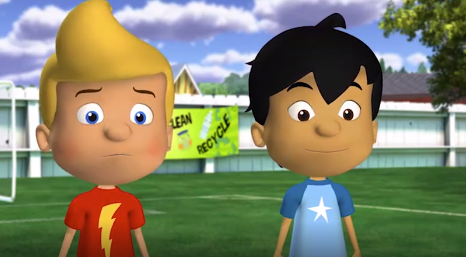Research
Did you know that animation is proven to strengthen learning?
Don’t just take our word for it! Below is peer-reviewed research linking animation to powerful social-emotional learning.
You can purchase WonderGrove S.O.A.R., based on this research, here.

Social Skills Are Critical for Those with Disabilities
“Youngsters and teenagers without disabilities learn these skills through peer interaction and social opportunities. Skills such as making and keeping friends, being a good listener, being a team player, and being assertive rather than aggressive are what contribute to future success as an adult. But for people with disabilities, most school environments provide little to no opportunity to develop these skills.”

Spongebob is Bad for Small Children, Study Finds
“The problems were seen in a study of 60 children randomly assigned to either watch "SpongeBob," or the slower-paced PBS cartoon "Caillou" or assigned to draw pictures. Immediately after these nine-minute assignments, the kids took mental function tests; those who had watched "SpongeBob" did measurably worse than the others

Cartoons Shed Light on Autism
“Their results indicated that while autistic children cannot recognize faces as typically developing people can, they have normally functioning brain tissue in the fusiform gyrus — the area of the brain specialized for facial recognition.”

Animated Characters and Motivation
“Video modeling has been one of the most popular and effective approaches for teaching social skills to children with special needs. The combination of animation with video modeling is an innovative and compelling approach for teaching social skills. One of the benefits of a motivating program such as this is that enhanced student motivation is likely to result in improved skill acquisition and reduced behavior problems.”

Young Children Show Improved Verbal IQ after 20 Days of Exposure to Music-Based, Cognitive Training ‘Cartoons’
“The cognitive benefit was striking and consistent in 90% of the children who took the four-week learning program and was additionally confirmed by brain imaging data that indicated brain changes had taken place related to the training.”

Research on Animated Characters and Motivation
“Research conducted by Ricci et al. proposed that instruction that included game-like features enhanced student motivation, which led to greater attention to training content and greater retention. Furthermore, Druckman added that games seem to be effective in enhancing motivation and increasing student interest in subject matter.”

Social Skills Interventions for the Autism Spectrum: Essential Ingredients and a Model Curriculum
“On a structured measure of social behavior, statistically significant change from pre- to post-testing was demonstrated on several scales, including talking with peers, initiating conversations with staff, appropriate facial expressions, and fluency of speech, despite the small sample size.”

Toddlers’ Learning From Socially Meaningful Video Characters
“Indeed, toddlers learned imitation tasks better when the onscreen character was socially meaningful (their mother) rather than a stranger, suggesting that social meaningfulness is important for early learning.”

Effects of Video Modeling on Social Initiations by Children with Autism
“Children with autism make or accept fewer social initiations and spend more time playing alone compared to their peers. Video modeling is a promising method for promoting social skills in these children.“

Teaching Social Skills Using Video Modeling Interventions
“Television also has the potential to teach pro-social behaviors to children. Recent research showed the striking result that television is no more prone to fostering violence than it is to fostering pro-social behavior. Forge & Phemister (1987) further suggested that watching cartoons can have the same positive effects as watching live-model pro-social programs. Among the benefits of pro-social cartoons and programs are elicitation of pro-social behaviors, altruism, nonverbal helping behaviors, and academic skills.”

A Review of Interventions to Reduce Challenging Behavior in School Settings for Students with Autism Spectrum Disorders
“On a structured measure of social behavior, statistically significant change from pre- to post-testing was demonstrated on several scales, including talking with peers, initiating conversations with staff, appropriate facial expressions, and fluency of speech, despite the small sample size.”
